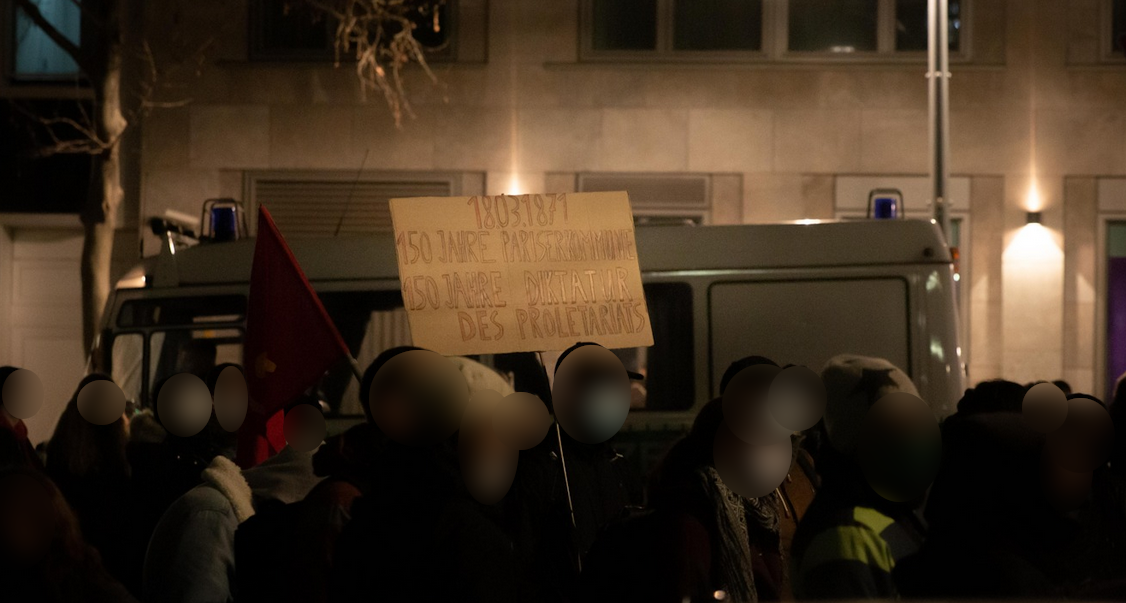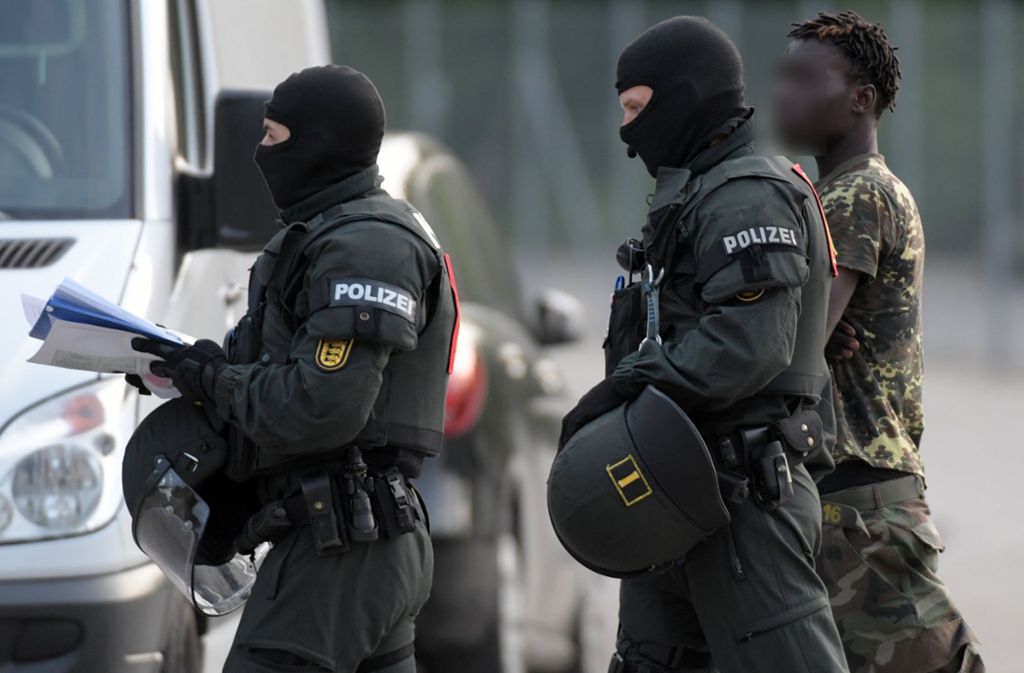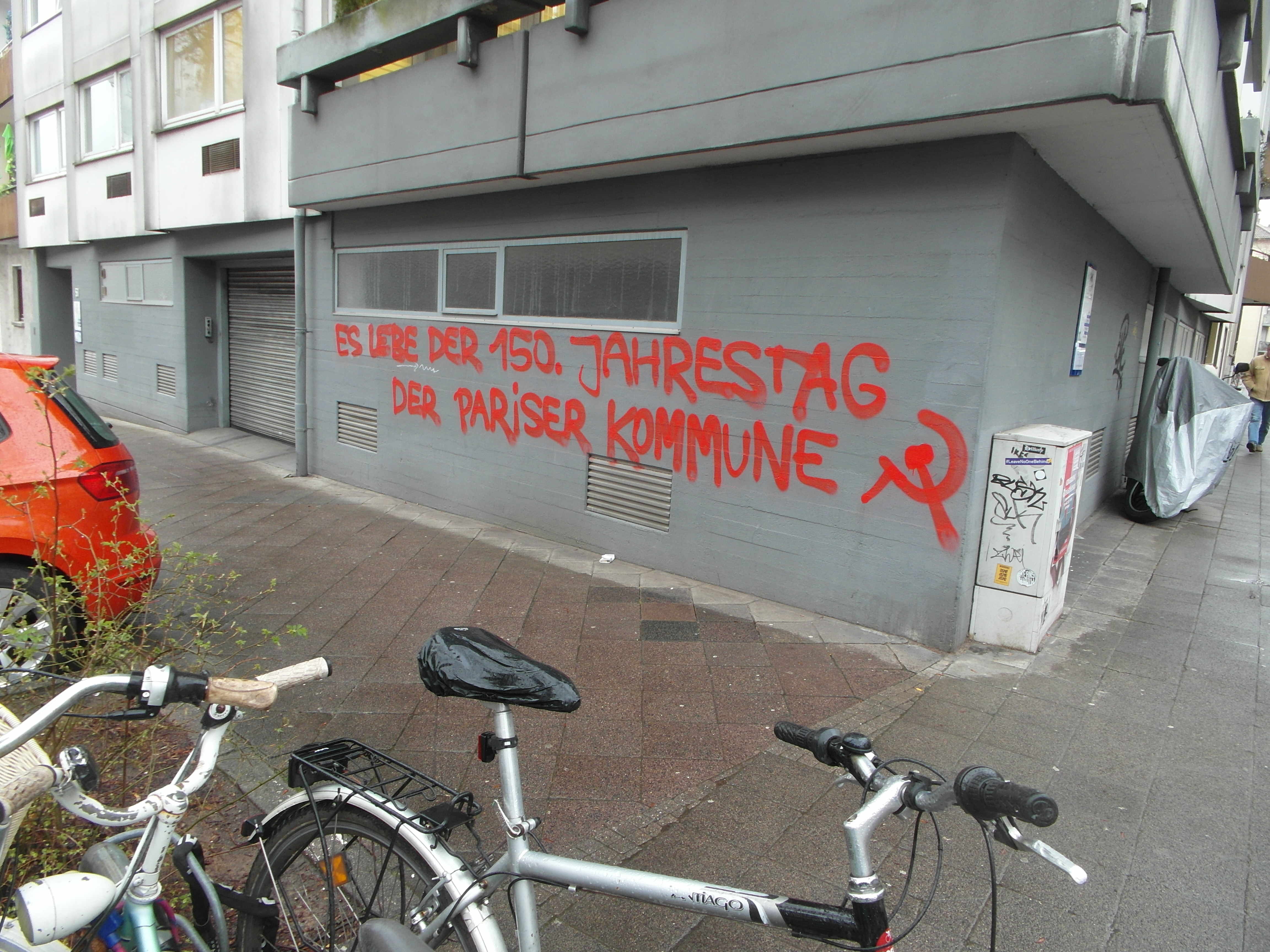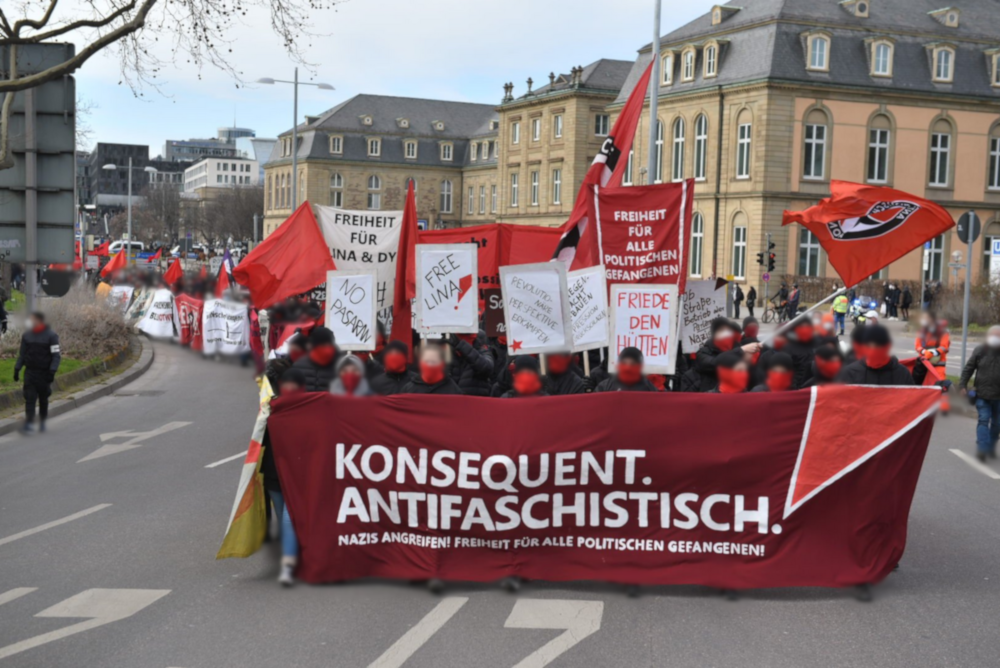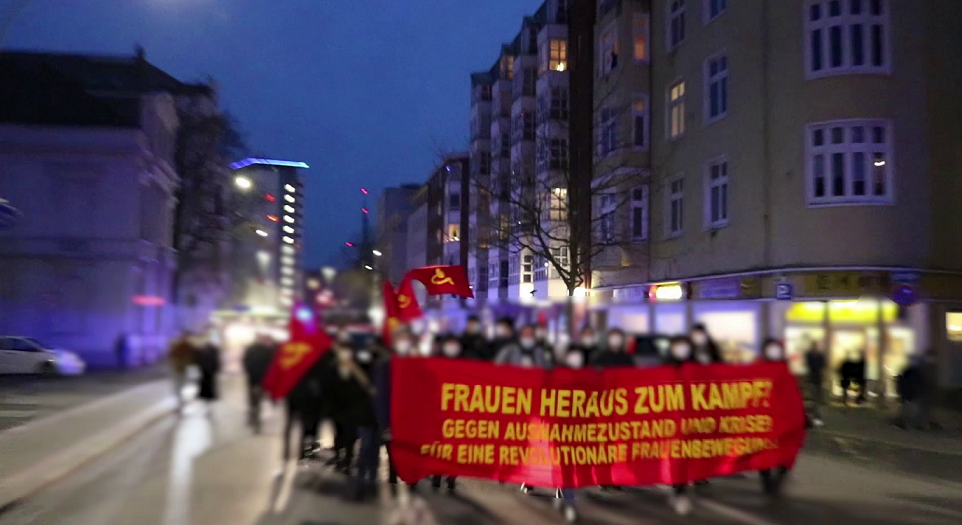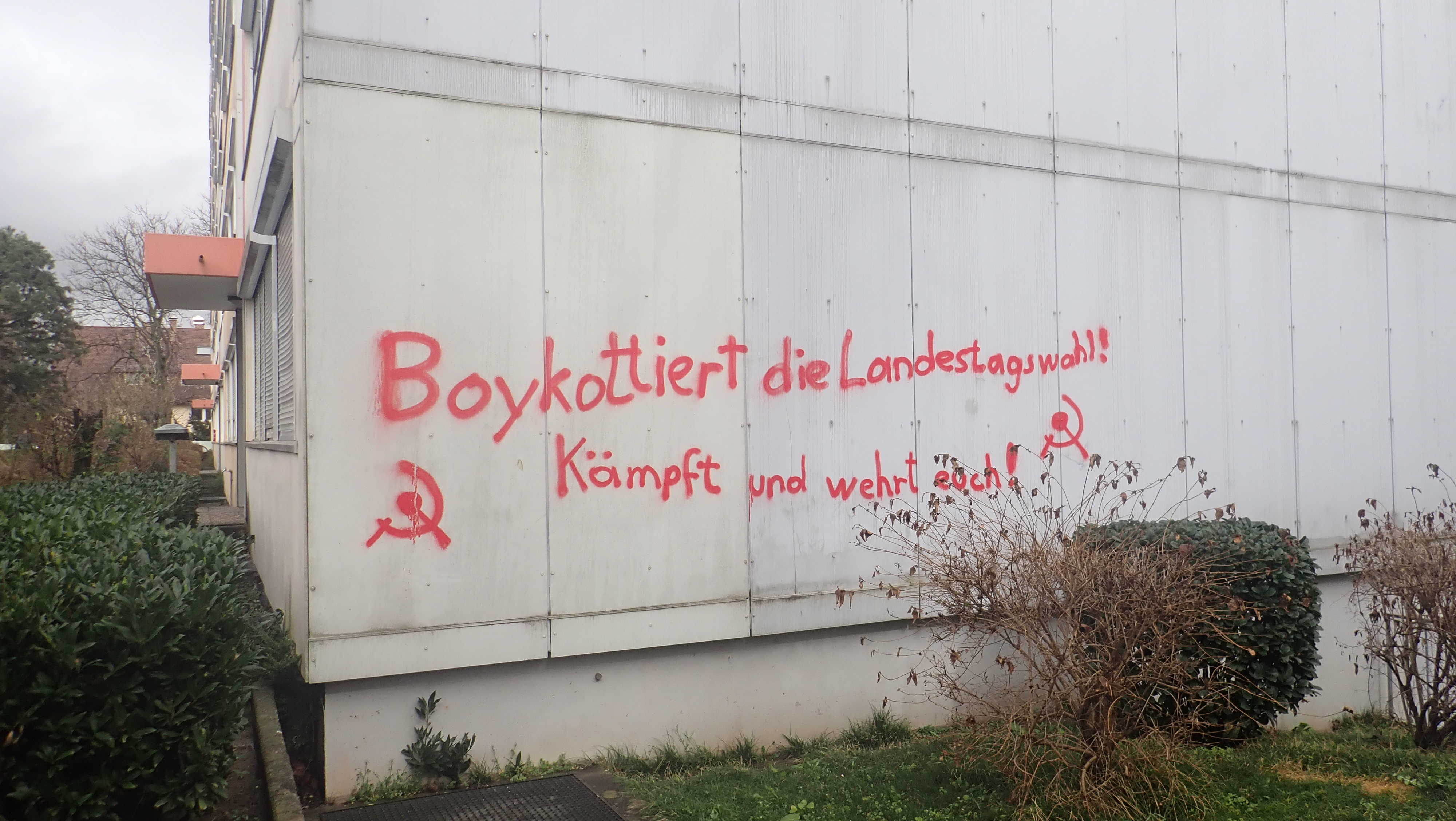Dokumente
Dokumente
- Details
- Category: Dokumente der kommunistischen Bewegung
Raise the red flag of the Paris Commune
as a weapon of combat!
Today, 18th of March, the international proletariat and the peoples of the world celebrate the 150th anniversary of the beginning of the heroic Paris Commune. It is the first attempt of the proletariat to storm the heaven, it gave rise to the first workers’ republic in history. Ten days after the popular uprising, the new revolutionary government declared the independence of the Commune from the old bourgeois power based in Versailles.
It is the heroism of the Communards who, by holding power in the hands of the proletarian masses for 71 days in Paris, made known to humanity a new form of state: the dictatorship of the proletariat.
Karl Marx, on May 30, 1871, two days after the last fighters of the Commune had succumbed to the superiority of the enemy’s forces, pointed out the universal historical scope of the experience of the Commune, thus: “The Commune … was … the political form at last discovered under which to work out the economical emancipation of Labour.” (The Civil War in France, Marx’s paper read on 30 May 1871 before the General Council of the International Working-Men’s Association – IWA).
This practical experience with its antecedent of the February Revolution of 1848, signified a leap in the understanding of the laws of revolution, which Marx defined in these words: “One thing especially was proved by the Commune, viz., that “the working class cannot simply lay hold of the ready-made State machinery, and wield it for its own purposes.” (See The Civil War in France. Address of the General Council of the International Working Men’s Association, German edition, p. 19, where this point is further developed.)” (Preface to the 1872 German Edition of the Manifesto)
The work of the Commune, according to Engels, was “shattering [Sprengung] of the former state power and its replacement by a new and truly democratic one … In reality, however, the state is nothing but a machine for the oppression of one class by another, and indeed in the democratic republic no less than in the monarchy; and at best an evil inherited by the proletariat after its victorious struggle for class supremacy, whose worst sides the victorious proletariat, just like the Commune, cannot avoid having to lop off at once as much as possible until such time as a generation reared in new, free social conditions is able to throw the entire lumber of the state on the scrap heap. Of late, the German philistine has once more been filled with wholesome terror at the words: Dictatorship of the Proletariat. Well and good, gentlemen, do you want to know what this dictatorship looks like? Look at the Paris Commune. That was the Dictatorship of the Proletariat.” (F. Engels’ “Introduction to K. Marx’ s The Civil War in France”, 1891).
Despite the glorious and relentless struggle of the Parisian proletariat to defend proletarian power, they were defeated by the forces of Versaillesian reaction in the service of the bourgeoisie, the landlords and all the thieves, all the parasites that the old society keeps in its bosom. The genocidal barbarism of the bourgeoisie would be revealed in broad daylight during the “bloody week” (21-28 May 1871).
The end of the Paris Commune in May 1871, far from signifying a simple defeat of the working class, was a historic milestone of great significance, “the glorious herald of the new society”, which marked the struggle of the international proletariat forever. The Paris Commune is the first great milestone in the process of the World Proletarian Revolution, the first time that the proletariat seized power, and therefore the position adopted on it and its just balance separates Marxism from revisionism.
We must not only celebrate this great milestone, we must study it in the light of the almighty ideology of the proletariat, almighty since it is true, Marxism-Leninism-Maoism, mainly Maoism. We must start from the imperishable work of the great Titan Karl Marx, The Civil War in France, with the numerous theoretical and practical, mainly practical, contributions which since 1871 have uninterruptedly developed our communist ideology, politics and organisation. The contributions of the other titans, Lenin and Chairman Mao, but also of the Great Engels, Comrade Stalin, and Chairman Gonzalo, allow us to place the contributions of the Paris Commune in the burning actuality of the new era and the third moment of the process of the World Proletarian Revolution, within the “50 to 100 years” in which imperialism and reaction will be swept away from the face of the Earth.
This epoch, marked by the collapse of imperialism, which generates tensions and turmoil throughout the world, is the time of the strategic offensive of the World Proletarian Revolution. Chairman Gonzalo puts forward that the process of the world revolution to sweep imperialism and reaction away from the face of the earth has three moments: 1st strategic defence; 2nd strategic equilibrium; and 3rd strategic offensive of the world revolution. The Commune opened the first moment, the strategic defensive of the revolution, which, applying the law of contradiction to everything, has as its counterpart the offensive of the counter-revolution.
Karl Marx considers that the main merit of the communards is that they attempted for the first time in history to create a proletarian state. He brilliantly establishes that the working class cannot simply take over the existing state machine and set it in motion for its own needs, but must dismantle it. Lenin pointed out that the Commune was a shining example of how the proletariat “was able to accomplish the democratic tasks which the bourgeoisie could only proclaim.” (Lenin, Lessons of the Commune). In analysing the social and economic measures adopted by the Parisian workers in The Civil War in France, Marx emphasised the idea that, however timid these measures were, their main tendency was the expropriation of the expropriators.
It was by taking Marx’s teachings of the Paris Commune that the Russian proletariat, under the leadership of the Bolshevik Party and the leadership of Lenin, triumphed with the Great October Socialist Revolution of 1917, building the Soviet Power, the dictatorship of the proletariat, as the true continuation of the Commune. The soviets were the highest form of organisation, through which the dictatorship of the proletariat led by the Great Lenin and Comrade Stalin was erected, based on the worker-peasant alliance, uniting the most backward and dispersed toiling and exploited masses, thus ensuring the uninterrupted passage from the bourgeois-democratic revolution to the socialist revolution.
When the masses, led by Chairman Mao Tsetung and under the leadership of the Communist Party, seized power in China in 1949, it was the experience of the Commune synthesised by Marx and developed by Lenin, which served as the basis for the immediate transition to the development of the socialist revolution and the dictatorship of the proletariat within the People’s Republic of China.
And later, during the Great Proletarian Cultural Revolution (GPCR), the great and highest milestone of the World Proletarian Revolution, it was the Three-in-One Revolutionary Committees, the new organs of power that were constituted as the continuators of the experience of the Commune.
The Three-in-One Revolutionary Committees, which originated in the tenacious struggle initiated and led by Chairman Mao Tsetung against capitalist restoration, were an indispensable instrument of the GPCR, through which millions of masses took into their own hands the affairs of the state, political, military, cultural, production, etc., and overthrew the representatives of the bourgeoisie who had entrenched themselves in the Party, the People’s Liberation Army and the state, preventing capitalist restoration in China for 10 years.
During the Commune we have the armed confrontation between two states of radically different types, the expression of the new and the old world. This is the heart of power, of all power, arms. The Commune affirmed the necessity of revolutionary violence and showed the force of civil war, establishing the practical proof of the Marxist principle, which would be developed by Chairman Mao, according to which “all power grows out of the barrel of a gun” and that “without a people’s army, the people will have nothing“. The “spectre haunting Europe” has become a real threat. Marx specifies that “Armed Paris was the only serious obstacle in the way of the counter-revolutionary conspiracy. Paris was, therefore, to be disarmed.” (Marx, The Civil War in France) Not only was power conquered by arms, but it was also maintained by revolutionary violence. This first experience showed that we can only prevent capitalist restoration through violence, which today is People’s War, and if the class has lost power, it is necessary to apply People’s War for counter-restoration.
Never surrender the guns of the National Guard, that is what the Communards are shouting 150 years later!
What does the experience of the Commune tell us about the question of leadership, of party leadership? In this respect, in his exchange of correspondence with Kugelmann on 12 April 1871, Marx points out the fatal errors of the Communards: 1) The offensive against Versailles should have been undertaken immediately, when the enemy was in a panic and had not had time to concentrate his forces. This opportunity was missed; 2) The Central Committee was too hasty in renouncing its powers to make way for the Commune.
Marx posits the need for the proletariat to have a unified Party capable of leading it in the tumults of the class struggle. The prevarication of the Communards divided into various “parties” was fatal to the Commune. Only a unified Party, practising democratic-centralism, guided by the ideology of the proletariat, has the capacity to wage war justly and to triumph.
Following the teaching of the Commune Maoism establishes: power is fundamental. A “power based on an armed force led by the Communist Party, conquered and defended through People’s War“. (CPP, On Marxism-Leninism-Maoism) The experience of the Commune, analysed by the brilliant Marx, already confirmed this necessity, nothing more! Who can deny that the Maoists are the faithful continuators of the heroic Communards, no one but the revisionists and those who disguise Marxism. This necessity posed by the Commune is expressed daily in our just and unwavering will to reconstitute/constitute/reorganise the Communist Parties and to prepare/initiate the people’s war. And, in the specific case of the difficult and complex problems that the People’s War in Peru is still going through, in order to get out of this situation, what corresponds is to reorganize the Party by and for the People’s War, by crushing the miserable rats of the revisionist and capitulationist right opportunist line (ROL). ROL-rats, who following the plan of imperialism and reaction call for “reconciliation” and beg for the forgiveness of reaction, pretending to make us believe that the “People’s War has ended in defeat”. Chairman Gonzalo has taught that even if there is only one communist left, he has the obligation to do it all over again and continue the road of the invincible People’s War.
The Civil War in France, a very important political document of the International, armed the international proletariat of the whole world with the experience of the Commune and was a brilliant demonstration of the ideological victory of Marxism over all variants of pre-Marxist socialism. “Towards the end of the first period (1848-71), a period of storms and revolutions, pre-Marxian socialism was dead.” (Lenin, The Historical Destiny of the Doctrine of Karl Marx) This brilliant synthesis of the experience of the Commune was of particular importance in the struggle against the petty bourgeois ideologues who denied the necessity of the dictatorship of the proletariat.
In The Civil War in France Marx defined with sharp clarity the role of these opportunist elements in the workers’ movement, showing that the revolutionary workers’ movement, in its contradictory development and as a direct result of its action, accumulates what Engels would call a “colossal heap of rubbish”. Every crisis, every moment when the class struggle sharpens, is the moment when we can and must sweep away revisionism and opportunism.
The present gigantic crisis shaking the world is one of those great moments when truth triumphs. Even more at this moment when the crisis of imperialism and bureaucratic capitalism is sharpening all over the world, all the contradictions are sharpening and the revolutionary situation, which is developing unevenly all over the world, is developing more and more, with the great activity of the masses, its explosiveness making all the reactionaries and their revisionist servants tremble; it is manifesting itself everywhere, marching to great explosions never seen before. This objective situation is being steadily met by the development of the subjective factor, mainly the process of the Communist Parties, as Marxist-Leninist-Maoist, mainly Maoist parties of a new type, militarised to initiate the new People’s Wars. Thus opening a new moment or period of revolutions as part of the new great wave of the World Proletarian Revolution, within the period of the “50 to 100 years” in which the strategic offensive of the world revolution is inscribed. It shows that revolution is the main historical and political tendency in today’s world. This situation determines the tasks, strategy and tactics of the Communist Parties throughout the world.
It would take only one reactionary election in the USA for the false defenders of “real” Maoism like Bob Abiakan and other leaders to show their true face to the world proletariat by defending the victory of the reactionary imperialist Biden.
Out of these crises the truth emerges, the “colossal rubbish heap” will be swept away by the action of the proletariat.
The revisionists and opportunists do not want to see that nothing is linear, that everything develops unevenly and that you have to fall in order to learn to walk. Those who do not accept the immense contribution of the experience of the People’s War in Peru on the pretext of repeating, without foundation, what imperialism-reaction-LOD propagates that “the people’s war ended in defeat”, would undoubtedly have spat on the experience of the Commune. Despite the defeat of the Commune Marx said, “Working men’s Paris, with its Commune, will be for ever celebrated as the glorious harbinger of a new society. Its martyrs are enshrined in the great heart of the working class.” (Marx, The Civil War in France)
As Lenin noted in The State and Revolution: “Although the mass revolutionary movement did not achieve its aim, he regarded it as a historic experience of enormous importance, as a certain advance of the world proletarian revolution, as a practical step that was more important than hundreds of programmes and arguments. Marx endeavored to analyse this experiment, to draw tactical lessons from it and re-examine his theory in the light of it.”
We true Marxists learn from every experience and affirm that the People’s War in Peru is the first act of the strategic offensive of the world proletarian revolution. Let the imperialists, reactionaries and their ROL servants of the hoax of the “peace letters” continue with their hyena dreams; because neither Chairman Gonzalo, nor the PCP, nor the real communists, nor the fighters of the PLA, nor the masses of the New Power ever surrendered their arms, nor accepted the “peace agreements” of the Yankee-CIA. Like the communards, they persisted in the People’s War. The demoralisation of the working class in the latter case would have been a far greater misfortune than the undoing of any number of “leaders”.
The complex and difficult problems that the People’s War in Peru entered were mainly due to the treachery of the revisionist and capitulationist rats of the ROL, who with the help of reaction infiltrated the party committees and resorted to throwing the rank and file against the leadership, to handing over the leaders who persisted, in the face of the failure of their call to lay down their arms and end the People’s War. The ROL plotted all of the above in exchange for the pardon of the exploiters and oppressors, the executioners of the revolution, disavowing Maoism, Chairman Gonzalo, Gonzalo Thought and the People’s War. Ridiculous characters who, in the hands of reaction, given body and soul to it, pretended that they were negotiating with reaction. What could they negotiate? Nothing! Only betrayal by proposing to exchange themselves in exchange for serving to infamous Chairman Gonzalo with their own treachery in order to annihilate the Party and the People’s War.
Maoism, as defined by Chairman Gonzalo, has been validated by facts and fire since the beginning of the People’s War in Peru, just as Marxism was validated by the blood of the communards. Both the Peruvian communists and the communards demonstrated their historical initiatives and the self-sacrifice of which Marx speaks in The Civil War in France. At present, the communists in Peru, holding firmly to the leadership of Chairman Gonzalo and Marxism-Leninism-Maoism, Gonzalo Thought, persist in the task of the general reorganisation of the Party in order to overcome the situation in which the People’s War finds itself because of the detention of Chairman Gonzalo, in absolute isolation since 1992, and the treachery of the ROL which was structured in the prisons with the help of the CIA-Reaction.
Another principle of the Commune that we must embody and grasp firmly at a time when reaction is trying to mobilise the masses to prepare its imperialist war plans is internationalism. As Marx said, the “banner of the Commune is the banner of the World Republic” is no more and no less. By appointing a German Minister of Labour and a Pole as chief of the defence of Paris, the Commune affirmed to the world that the proletarians of all countries must unite to defeat their enemies.
Chairman Mao said it very well, internationalism is the spirit of communism! From the organisational point of view, the experience of the concrete and active support to the Commune by the International Workers’ Association (1st International) has sharpened the struggle against the anarchist vision of the IWA. Marx and Engels affirmed from the IWA congress after the Commune that the General Council is not a simple information office as the anarchists want, but a real general staff of the proletariat. Since the Commune, the bourgeoisie has taken note of the danger represented by the internationally organised workers. This irrational fear will turn into terror after the creation of the Third International following the victorious Great Revolution of October 1917. Today more than ever the need to reconstitute a General Staff of the proletariat is one of our urgent tasks!
On this road, in the present situation, the call of the Maoist Communist Parties and Organisations for the holding of the First Unified International Maoist Conference (UIMC) and the birth of the New International Organisation of the Proletariat (NIOP) is of great importance.
The Commune is part of this “epic of the class struggle“, as Chairman Gonzalo said correctly. It is the proof that “only the class struggle can generate our ideology” and only“the class struggle whose centre is politics as the conquest and defence of power for the class by overthrowing other powers, only as the practice of research, could the class, generating titans of thought and action“.
Marxism-Leninism-Maoism, mainly Maoism shows in everyday life its vividness as a continuation of the heroic epic of the proletariat for the emancipation of mankind. It shows even more its full veracity in the relentless struggle that Maoists are waging all over the world to strengthen the People’s Wars in India, Peru, Turkey and the Philippines, to launch new ones, to reconstitute the communist parties and to set out once again to conquer the skies.
Today we need to take the initiative, dare to fight, not to be afraid to give our blood for the great cause of the World Proletarian Revolution. Doubt, prevarication, is a fault when the new great wave of revolution is developing and a new period of revolutions is announced as the positive aspect of the gigantic crisis of imperialism and its offspring bureaucratic capitalism with the explosions of the masses. We are living in a time of great storms and great transformations in the whole world. Crush revisionism, unmask opportunism, strengthen ourselves ideologically, because the advance of the WPR needs to sweep away the “heaps of rubbish”! Denounce and firmly confront the imperialist wars of plunder with People’s War. Make the democratic revolution and socialist revolution with People’s War, as the main form to be prepared for the case of an imperialist world war. Transform, like the Commune, the imperialist war into a civil war of the oppressed classes against their oppressors, into a war for the expropriation of the capitalist class, for the conquest of political power by the proletariat, for the realisation of socialism.
Let us be exemplary like the glorious communards, let us raise the red banner of the world proletarian revolution for communism with People’s War! Let us be faithful to the heroic communards, raising, defending and applying Marxism-Leninism-Maoism, mainly Maoism!
“Working men’s Paris, with its Commune, will be for ever celebrated as the glorious harbinger of a new society. Its martyrs are enshrined in the great heart of the working class. Its exterminators history has already nailed to that eternal pillory from which all the prayers of their priests will not avail to redeem them.” (Marx, The Civil War in France)
Today only the Maoists raise the red banner of the Commune as a weapon of combat!
Signatories:
Committee for the Reconstitution of the Communist Party of the United States
Committees for the foundation of the (Maoist) Communist Party of Austria
Committee Red Flag – FRG
Communist Party of Brazil (Red Faction)
Communist Party of Colombia (Red Faction)
Communist Party of Ecuador – Red Sun
Communist Party of Peru
Maoist Committee in Finland
Maoist Communist Party (French State)
Serve the People – Communist League of Norway
Communist Group (Maoist), China
Revolutionary Nucleus for the Reconstitution of the Communist Party of Mexico (NR-PCM)
Red Faction of the Communist Party of Chile
Communist Party of Turkey/Marxist Leninist
- Details
- Category: BRD
On 18.03. the 150th anniversary of the Paris Commune, a rally in solidarity with Pablo Hasél took place in Berlin.
- Details
- Category: BRD
In May 2018, there was a raid on the state's initial reception facility ("refugee home") in Ellwangen near Stuttgart. Now one of the victims is suing the police for their actions.
Three days after a failed deportation, the cops entered the refugee home at night without announcing themselves as such and without a search warrant. This deportation failed because the residents of the home correctly resisted the terror of the German state at the time. During the subsequent raid, the plaintiff, a 31-year-old from Cameroon, was forcibly taken to the floor in his room and tied up. In addition, he was deprived of his cell phone, which he had used to document the raid. He was then deported to Italy.
The truth is of no use to the German state. The officials claim that such an attack is "common" and "necessary for self-protection". The fact that the man's cell phone was taken from him was denied by the two witnesses, both police officers, organized in the same state-affiliated armed gang as the defendants and, of course, complicit in trespassing into the home, which is officially considered a dwelling. I wonder if they could be impartial?
Now court hearings have occurred, accompanied by a "Black lives matter" protest, in which the plaintiff has also participated. Currently, the outcome of the trial is still unclear, but as usual, it is expected that the perpetrators will get off scot-free.
- Details
- Category: BRD
Actions were also carried out in Baden-Württemberg to mark March 18. In Freiburg, a demonstration was organized under the slogan "Freedom for all political prisoners", which started with a rally at the square of the old synagogue.
Various organizations from the revolutionary and anti-fascist movement were involved. In the speeches, the participants demanded freedom for different political prisoners, including the imprisoned antifascists Dy and Lina. In the process, mobilization was also made for the demonstration on the 20th in Stuttgart.
The demonstration then moved through the city to the prison, where more speeches were held. In a last speech, revolutionaries demanded to unite even more firmly against the attacks of the bourgeois state and to answer them unitedly. They also called on all present to fight for the freedom of those who have to pay for our struggle with their freedom. In particular, they mentioned in their speech Georges Ibrahim Abdallah, Dr. G.N. Saibaba, Mumia Abu-Jamal, Leonard Peltier and Chairman Gonzalo. They then used their speech to also remember those who were murdered and imprisoned by reaction in the fight for the Paris Commune. The Paris Commune was classified as a decisive event in the history of the proletariat that still resonates in the struggles of our class today. The speech ended with the words "Freedom to all political prisoners!". Long live the 150th anniversary of the Paris Commune!"
In Karlsruhe, on the night of March 18-19, a graffiti was painted with the slogan "Long live the 150th anniversary of the Paris Commune!"
Translated with www.DeepL.com/Translator (free version)
- Details
- Category: BRD
On the 20th of March, in the city of Stuttgart a combative demonstration marched against state repression and fascism in which about 1000 progressive forces took part, among them was a contingent of proletarian revolutionaries.
- Details
- Category: Proletarischer Feminismus
We document a video with impressions of the 8th of March in the FRG.
- Details
- Category: BRD
Last Sunday, the state elections took place in Baden-Württemberg. On this occasion, posters were stuck up in the working-class neighborhoods in Freiburg and hundreds of leaflets were distributed propagating the boycott of the election. In Karlsruhe and Lahr, among other places, some posters calling for a boycott of the state elections have also appeared.
- Details
- Category: BRD
On Saturday night, 6th of March residents of the district Freiburg Haslach met in a bar to play cards. Because of this, the cops rammed down the door and controlled everybody that was present. To this end, tents and a spotlight as high as the roof were put up. The cops were so heavily armed and masked, the residenst fisrt thought special forces were deployed, which the police denied afterwards.
